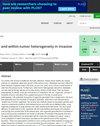在稀疏、不规则采样的长期神经行为时间序列中检测周期的方法:对长期发作间癫痫样活动进行多项式去趋势的基线追踪去噪方法
IF 3.6
2区 生物学
引用次数: 0
摘要
许多生理过程都是周期性的,但要对这些过程进行足够密集的采样,以进行频率分解和后续分析,却很有难度。对稀疏和不规则采样信号进行分解和重建的数学方法已经成熟,但在生理应用中却未得到充分利用。我们开发了基于多项式去趋势的基序去噪(BPWP)模型,可以从稀疏和不规则采样的时间序列中恢复振荡和趋势。我们在一个独特的数据集上验证了这一模型,该数据集是用一种新型研究设备记录的人类海马长期发作间癫痫样放电(IED)率,该设备具有连续的局部场电位传感功能。痫样放电率具有与睡眠、觉醒和癫痫发作群相关的成熟的昼夜和多日周期。鉴于从伏卧者的多月颅内脑电图记录中获得的 IED 率样本稀少且不规则,我们使用 BPWP 计算了窄带频谱功率和多项式趋势系数,并识别了三个受试者的 IED 率周期。在特定情况下,我们建议利用随机和不规则采样对生理信号进行频率分解。试验注册:NCT03946618.本文章由计算机程序翻译,如有差异,请以英文原文为准。
Method for cycle detection in sparse, irregularly sampled, long-term neuro-behavioral timeseries: Basis pursuit denoising with polynomial detrending of long-term, inter-ictal epileptiform activity
Numerous physiological processes are cyclical, but sampling these processes densely enough to perform frequency decomposition and subsequent analyses can be challenging. Mathematical approaches for decomposition and reconstruction of sparsely and irregularly sampled signals are well established but have been under-utilized in physiological applications. We developed a basis pursuit denoising with polynomial detrending (BPWP) model that recovers oscillations and trends from sparse and irregularly sampled timeseries. We validated this model on a unique dataset of long-term inter-ictal epileptiform discharge (IED) rates from human hippocampus recorded with a novel investigational device with continuous local field potential sensing. IED rates have well established circadian and multiday cycles related to sleep, wakefulness, and seizure clusters. Given sparse and irregular samples of IED rates from multi-month intracranial EEG recordings from ambulatory humans, we used BPWP to compute narrowband spectral power and polynomial trend coefficients and identify IED rate cycles in three subjects. In select cases, we propose that random and irregular sampling may be leveraged for frequency decomposition of physiological signals. Trial Registration: NCT03946618.
求助全文
通过发布文献求助,成功后即可免费获取论文全文。
去求助
来源期刊

PLoS Computational Biology
生物-生化研究方法
CiteScore
7.10
自引率
4.70%
发文量
820
期刊介绍:
PLOS Computational Biology features works of exceptional significance that further our understanding of living systems at all scales—from molecules and cells, to patient populations and ecosystems—through the application of computational methods. Readers include life and computational scientists, who can take the important findings presented here to the next level of discovery.
Research articles must be declared as belonging to a relevant section. More information about the sections can be found in the submission guidelines.
Research articles should model aspects of biological systems, demonstrate both methodological and scientific novelty, and provide profound new biological insights.
Generally, reliability and significance of biological discovery through computation should be validated and enriched by experimental studies. Inclusion of experimental validation is not required for publication, but should be referenced where possible. Inclusion of experimental validation of a modest biological discovery through computation does not render a manuscript suitable for PLOS Computational Biology.
Research articles specifically designated as Methods papers should describe outstanding methods of exceptional importance that have been shown, or have the promise to provide new biological insights. The method must already be widely adopted, or have the promise of wide adoption by a broad community of users. Enhancements to existing published methods will only be considered if those enhancements bring exceptional new capabilities.
 求助内容:
求助内容: 应助结果提醒方式:
应助结果提醒方式:


